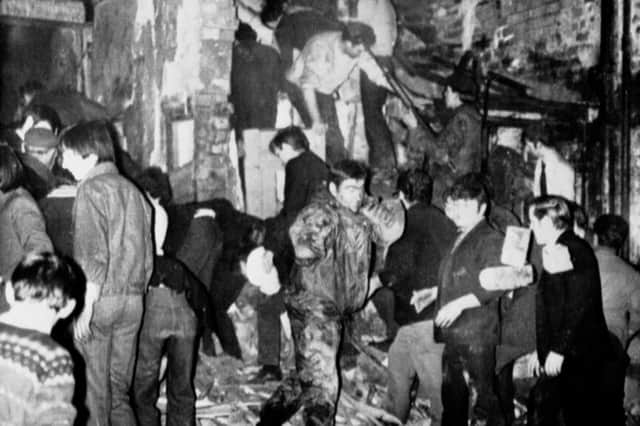PSNI admission on ‘bias’ finding


The acceptance was disclosed at an ongoing legal battle by relatives of those killed in the loyalist attack to have a controversial report into the massacre completely binned.
Fifteen people were murdered when the north Belfast pub was blown up by the UVF on December 4, 1971.
Advertisement
Hide AdAdvertisement
Hide AdIn 2011 Northern Ireland’s police ombudsman identified investigative bias in how the RUC handled the case.
The watchdog concluded that detectives failed to properly probe loyalist paramilitary responsibility for the bombing because they were so focused on the mistaken view that the IRA was to blame.
At the time of the attack it was suggested that it may have been an accidental “own goal”.
But a separate review carried out by the police’s now defunct Historicial Enquiries Team (HET) reached a different verdict.
Advertisement
Hide AdAdvertisement
Hide AdIt claimed there was no evidence of any bias on the part of the RUC investigators.
Those findings have been challenged by Brigid Irvine, whose mother Kathleen was among those killed in the attack.
Despite the court being told back in September 2015 that the chief constable at the time, George Hamilton, was no longer contesting the police ombudsman’s conclusions on the issue, Ms Irvine’s lawyers continued to press for the entire HET report to be quashed.
As a full hearing of the case finally got under way, it emerged that a further concession had been made in legal papers lodged on behalf of the PSNI earlier this week.
Advertisement
Hide AdAdvertisement
Hide AdMr Justice Humphreys told counsel for the victims’ relatives: “It might be thought through slightly gritted teeth, but nonetheless it seems there’s a concession that the finding in the original HET report that there was no investigative bias is irrational and contrary to the weight of the evidence.
“Therefore, your application for judicial review succeeds.”
Submissions then centred on a dispute about whether the report should be edited or completely scrapped as a “nuclear option”.
Frank O’Donoghue QC, representing Ms Irvine, claimed the court had been misled for years into believing the chief constable saw nothing unlawful about the HET’s conduct.
He told the court how police wrongly briefed politicians and the public following the bombing that it had been an IRA attack.
Advertisement
Hide AdAdvertisement
Hide Ad“The families have had to live with the stigma that has been created by that conduct on the part of the police over many years,” counsel said.
“That stigma is not removed until there is a formal, public and open acceptance by the police that the promotion of this theory that it was an inside job, an own goal, an IRA bomb was the result of very clear investigative bias by those who investigated this bombing.”
Peter Coll QC, for the chief constable, countered that the police ombudsman’s conclusions on RUC investigative bias were accepted as far back as September 2015.
“The issue here is whether the entire report needs to be effectively binned,” he said.
Proceedings were adjourned for a month to give both sides time to discuss a possible solution.